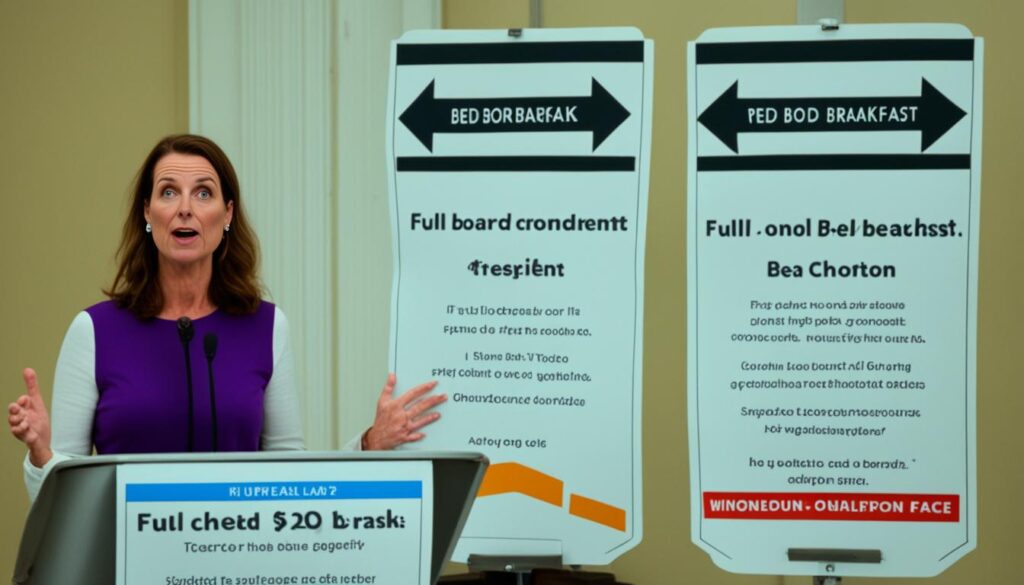Last Updated on: 30th July 2024, 06:14 pm
When planning your next trip, understanding various lodging options, such as full board, is crucial. The term “full board” harks back to the history of inns where travelers paid for both room and board—a wooden board where meals were served. Today, this concept has evolved significantly.
In contemporary hotel operations, full board includes breakfast, lunch, and dinner, catering to guests who prefer all-inclusive meals.1 This concept is especially popular among leisure travelers who wish to spend most of their time relaxing on-site.1 Historical inns offering room and board have set a precedent for modern accommodations, which now provide varied dining packages, including full board, matching diverse guest preferences. Understanding what does full board mean can help you make an informed choice for your stay, maximizing comfort and convenience.
Key Takeaways
- Full board in modern hotels includes breakfast, lunch, and dinner.2
- The concept originates from historical inns offering room and meals on a physical board.
- Full board appeals to guests who enjoy relaxing at the hotel throughout the day.1
- Understanding the lodging with full board enhances the guest experience and eases meal planning.1
- Learning about board basis explanation can help you choose the most suitable lodging option.
Understanding Hotel Board Packages
Hotel board packages offer a spectrum of choices, catering to varied preferences and budgets. Among these, half board and full board are popular for flexibility and comprehensive meal plans, respectively. Half board typically includes two meals, breakfast and either lunch or dinner, often served as buffets or set menus with options for each course1. Drinks, however, are usually included only with breakfast in these packages1. Full board provides breakfast, lunch, and dinner, often served as buffets and may include one beverage during lunch or dinner, or have drinks available a-la-carte or as packages1.
All-inclusive accommodations take convenience to another level, covering all meals and drinks throughout the day, including buffets, specialty venues, snack bars, and room service1. These packages are especially popular for guests who prefer staying within the resort for most of their trip, resulting in higher guest satisfaction due to convenience and value for money2. In contrast, all-inclusive options tend to be pricier due to their extensive amenities, while full board packages, offering a lower upfront cost, are more common in mid-range to luxury hotels2. All-inclusive packages represent around 20% of hotel bookings and are gaining popularity3.
The choice between half board and full board depends on factors such as flexibility, cost, and convenience. Full board is more structured, offering maximum convenience, but less flexibility in dining options; thus, it is better suited for longer stays3. On the other hand, half board provides more dining flexibility, allowing guests to explore local restaurants during their trip3. It helps when these hotel board packages are made easily searchable with clear explanations of inclusions to drive bookings and ensure guests align their choices with their travel style1.
Statistical analysis shows that these board packages also cater to different types of guests. Data suggests that all-inclusive resorts attract a diverse range of guests like families, honeymooners, and groups2, while full board hotels are often favored by couples and solo travelers seeking more flexible dining options2. The varied guest demographic and their preferences significantly highlight the importance of offering customized board packages.
For hotels, offering these diverse hotel board packages can also be a strategic move to manage costs and operations effectively. By providing half board and full board or all-inclusive accommodations, hotels can optimize their dining services, streamline operations, and enhance guest satisfaction. Furthermore, opportunities to drive extra revenue can arise from multi-day event packages or seasonal deals like Christmas, New Year’s, or Valentine’s Day1. With careful planning and targeted marketing, hotels can enhance both guest experience and profitability through these tailored board packages.
What Does Full Board Mean?

Full board is a lodging option that includes breakfast, lunch, and dinner in the overall price of the stay, offering a comprehensive meal plan for guests. This type of package is especially popular among those who want a hassle-free dining experience without the need to venture outside the accommodation premises for meals.
Full Board Definition
When it comes to what does full board mean, well it encompasses three primary meals each day: breakfast, lunch, and dinner. These meals are typically served in the hotel’s main dining area and can be presented in various styles, such as buffet or set menus. Hotels commonly offer board packages like half board and full board to cater to different guest preferences and needs1. By opting for a full board plan, guests can enjoy the convenience of having all their daily meals covered, contributing to a worry-free vacation.
Full Board Meal Plan
A full board meal plan includes three essential meals: breakfast, lunch, and dinner1. Breakfast is usually served buffet-style, offering a wide array of choices to start the day. Lunch and dinner may also follow a buffet format, although some hotels provide set menus or à la carte options. Full board options may cost less than All Inclusive stays, providing guests with more freedom to explore local cuisine2. In addition, some hotels might offer packed meals for guests planning day trips, ensuring they don’t miss out on any meal opportunities.
Benefits of Full Board
One of the main benefits of full board is the all-inclusive nature of the meal plan, which can significantly enhance a guest’s stay. Full board holidays are surprisingly affordable, often offering great value for money deals, costing not much more than a week of self-catering4. This type of lodging option is particularly advantageous for those staying at secluded resorts or mid- and upscale beach hotels, where guests seek to relax and stay at the property for the whole day1. Additionally, full board hotels are typically preferred by couples for a relaxing time and cost-effective accommodation2.
Overall, the inclusive board option such as full board ensures guests can enjoy their stay without worrying about additional meal expenses, leading to a more relaxing and predictable holiday experience. The ability to clearly understand what is included can also increase guest satisfaction and the likelihood of bookings1.
Full Board vs All-Inclusive

When planning a vacation, deciding between full board and all-inclusive packages can significantly impact your experience. Understanding the differences between these options helps in making an informed choice that aligns with your travel needs.
Full board typically includes breakfast, lunch, and dinner only in the price paid for the hotel stay, which makes it a cost-effective choice for many travelers2. One of the primary pros of full board is the opportunity to explore outside dining options, allowing guests to savor local cuisine and restaurants2. Moreover, full board hotels may cost less than all-inclusive stays, making them particularly attractive for couples seeking a more relaxed and less structured environment2.
On the other hand, all-inclusive reservations generally cover breakfast, lunch, dinner, snacks, drinks, and additional amenities specific to the hotel2. This approach ensures an organized and budget-friendly trip with top-tier facilities at your disposal2. Additionally, all-inclusive packages may be especially suitable for families, guaranteeing a worry-free vacation experience where every need is catered to, from meals to entertainment2.
Let’s break down the core differences between full board and all-inclusive options:
| Aspect | Full Board | All-Inclusive |
|---|---|---|
| Meals Included | Breakfast, Lunch, Dinner | Breakfast, Lunch, Dinner, Snacks, Drinks |
| Cost-Effectiveness | Often cheaper than all-inclusive | Usually higher, but more comprehensive |
| Dining Flexibility | Allows external dining | Meals typically limited to the resort |
| Suitable For | Couples, relaxed travelers | Families, high-amenity seekers |
For further insights, you can read more about the differences between full board vs all-inclusive.
Choosing between full board and all-inclusive often depends on your travel preferences, budget considerations, and the type of experience you seek. With these differences outlined, you can better determine which package aligns with your vacation goals.
Choosing the Right Board Basis for Your Stay

When it comes to booking the right lodging, choosing the right board basis is critical for ensuring that your travel experience aligns perfectly with your preferences and needs. Understanding your travel style is essential as your choice between bed & breakfast, half board, full board, or all-inclusive can significantly impact your trip.
For travelers who enjoy exploring local cuisine, bed & breakfast options provide the flexibility to savor breakfast at your accommodation while leaving other meals open to discovery. According to Virtuoso, 55% of travelers preferred Bed & Breakfast in 2022, highlighting its growing popularity3. Half board offers a middle-ground by including breakfast and either lunch or dinner, catering equally to travelers globally alongside Bed & Breakfast as of 20213.
Those looking for a more comprehensive meal plan might consider full board, including all three main meals, ideal for travelers who desire convenience without the need to forage for food. While this option is not as highly favored as others, it ensures fewer additional costs during stays, making it an attractive option for hassle-free dining and relaxation.
All-inclusive packages take it a step further by covering meals, drinks, and sometimes even snacks throughout the day. Representing 20% of hotel bookings, an all-inclusive stay offers a substantial portion of travelers a bundled amenities package for a more relaxed vacation3. Consider your personal eating habits and whether you value unlimited access to food and drinks when choosing the right board basis for families or groups.
A table summarizing the key features of these different board bases can help in booking the right lodging:
| Board Basis | Meals Included | Advantages |
|---|---|---|
| Bed & Breakfast | Breakfast Only | Flexibility to explore local dining options; rising in popularity with 55% preference in 20223 |
| Half Board | Breakfast and either Lunch or Dinner | Balanced option for travelers; equally popular as Bed & Breakfast in 20213 |
| Full Board | Breakfast, Lunch, and Dinner | Convenient for those who prefer all meals covered without searching for food during the day |
| All-Inclusive | All Meals, Drinks, and Snacks | Comprehensive; 20% of travelers prefer this package3 |
Ultimately, when considering booking the right lodging, weigh your options by taking into account the purpose of your trip, eating habits, and level of desired flexibility. With these factors in mind, you can confidently choose the board basis that best fits your travel needs.
Conclusion
As we wrap up the discussion on what does full board mean, it’s essential to reiterate the comprehensive benefits and considerations mentioned throughout this article. Understanding the concept of “full board” is crucial for travelers seeking a stress-free dining experience. This option typically includes breakfast, lunch, and dinner, offering a seamless experience for guests who prefer not to worry about finding meals during their stay. The benefits, such as convenience and potentially fewer additional charges, make full board a favorable choice, especially for leisure travelers and those staying in secluded resorts.
When comparing full board to other meal plans like all-inclusive, it’s clear that each option has its unique advantages. Full board covers the main meals but may not include drinks and snacks, providing a balanced option for those who do not wish to pay for additional services they might not use under an all-inclusive plan. Selecting the right board basis ultimately depends on individual preferences and the nature of the trip. Key factors like the purpose of the stay, personal eating habits, and desired flexibility should guide your decision in choosing between half board, full board, or all-inclusive packages.
In determining whether to grant or deny a petition under paragraph (A)(1) of the rule, the board members must reach a decision by a majority vote5. This decision-making process also applies to full board options within the realm of parole board regulations and other related situations. Additionally, media representatives can attend a full board hearing, with possible limitations imposed by the chair based on space constraints5. At the conclusion of a full board hearing, the parole board shall move into an executive session for deliberation5. Understanding these nuances provides better insight into how full board decisions are handled both in travel and other formal settings.
Ultimately, your choice in board basis should align with your travel needs and budget. By understanding the advantages and potential limitations of full board options, you can make informed decisions that enhance your overall lodging experience. For more information on the administrative aspects related to full board, you can refer to the guidelines outlined by the Department of Rehabilitation and Correction.
FAQ
What does full board mean?
How does full board differ from all-inclusive accommodations?
What are the advantages of choosing a full board meal plan?
What types of meals are included in a full board plan?
How do full board packages cater to different types of guests?
Why do hotels offer different board packages?
What should guests consider when choosing the right board basis for their stay?
What are the benefits for hotels offering full board options?
Source Links
- https://www.cvent.com/uk/blog/hospitality/half-board-vs-full-board
- https://www.hotelcontractbeds.co.uk/blog/full-board-vs-all-inclusive
- https://www.internationalbrandequity.com/half-board-vs-full-board/
- https://www.broadwaytravel.com/blog/difference-between-full-board-and-all-inclusive/
- https://codes.ohio.gov/ohio-administrative-code/rule-5120:1-1-08
Aparthotel Glossary

As a passionate, global-thinking Real Estate Investor I am constantly looking for the best opportunities to invest in Properties. With Aparthotel.com I am building an All-In-One Global Real Estate Platform, where people can analyse, rent or invest in properties. Additionally I help Investors with comparing the best financing options as well as give detailed Consultation on the buying process for Real Estate Investments around the world. I am looking forward to sharing my knowledge on this Website and feel free to reach out to me if you have any questions.

Comments